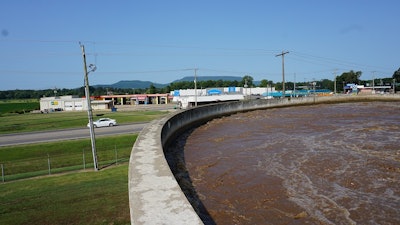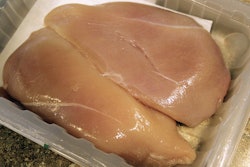
Tyson Foods Inc.’s wastewater treatment complex in Dardanelle, Arkansas, produces exceptionally clean water.
For its dedication to clean water and exceptional treatment performance, Tyson Foods Inc.’s broiler processing complex in Dardanelle, Arkansas, was selected as the winner of the 2022 U.S. Poultry & Egg Association’s Clean Water Award in the full treatment category. The complex operates cleanly and inconspicuously in the heart of Yell County, Arkansas.
Wastewater treatment
The Dardanelle Complex processes about 250,000 birds per day at an average weight of 3.87 pounds. It treats an average flow of 870,000 gallons of wastewater per day. Karalea Wells, Tyson Foods' complex environmental manager, said the wastewater facility was built in 1975 and has received a few structural upgrades since then, but continues to be effective at fully treating water for discharge into the Arkansas River.
The facility is located off local Arkansas Highway 7 in Dardanelle and backs up to businesses and residences. It’s only a mile away from the Arkansas River, too. Wells said the plant must operate inside its existing footprint and cannot expand. The major structures of the wastewater treatment operation are 30 years old, but the treatment facility still clears more than 99% removal efficiency of pollutants.
Moreover, she said, it has not exceeded a permit requirement for discharge and rarely receives odor or noise complaints from neighbors. To help control odors and the wastewater operation does not use a wasting lagoon.
In 2015, the wastewater facility installed stationary dissolved oxygen meters into its completely mixed activated sludge (CMAS) tank. The meter allows the automation of the aeration machinery which aids in treatment. This saves electricity, reduces odors and keeps the environmental conditions in this phase of treatment consistent. At the same time, it added supervisory control and data acquisition (SCADA) software to its system, allowing for remote control of processing and greater oversight of treatment.
In 2019, Wells said, the complex installed clarifier weir covers to block sunlight and inhibit algae growth. This saves the wastewater operators from the tedious and cautious work of cleaning the weirs. The facility is planning on adding new rotary screens to its offal processing area in 2022 to better filter the influent stream.
The Dardanelle facility also cleans the stormwater runoff exiting its property by using a unique filtration system on the portion of the property with the most potential pollutant opportunities.

Water reuse and recycling
The facility also takes strong measures to conserve water and reduce its landfill impact.
Wells said about 2.25 million gallons of treated wastewater is reused in the offal department each month. This alone saves about 27 million gallons of fresh water per year. Elsewhere throughout the plant, measures are taken to evaluate each phase of the plant and limit wasting water and electricity. She noted a recent, major water heater repair that will save the facility another 7.5 million gallons of fresh water.
Community involvement
With more than 70 years of continuous operation in the city, the community is critical to Tyson Dardanelle, Wells said.
“Our community relations are strong as we continue to provide monetary donations, product donations and our volunteer hours,” Wells said. “Our community involvement would take me too long to list, but nearly every other weekend someone from Tyson is cooking donated chicken for an event.”
The facility also participates in local recycling and environmental efforts. Wells said on past Earth Days, the facility participated in planting native trees near local schools and building pollinator gardens near a local community organization for children.
Innovating in recycling at Tyson's Nashville, Arkansas complex www.WATTAgNet.com/articles/43674
















